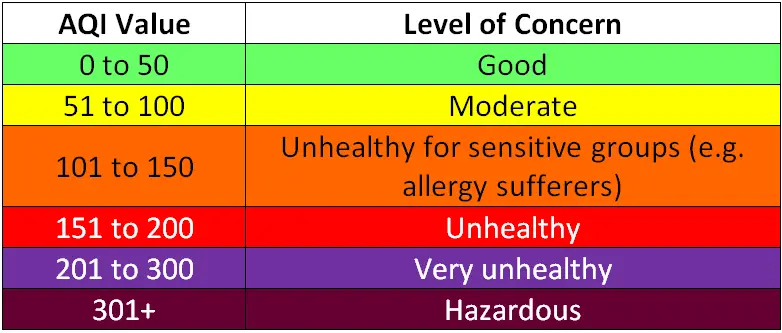
If you ever want to know what does unhealthy air quality mean, this article will help you be informed. This bad air quality will affect your health and you’ll most likely experience it if you live in an urbanized city with lots of pollution.
You don’t have to settle with such pollution – we care about your respiratory health and that’s why we wrote this article. You’ll find fast facts about air quality and when it is considered dangerous. After all, we don’t want you to get sick due to unhealthy air levels.
Bad air quality can stem from living near a highway or an industrial location. In some cases, it could be because of mold problems, leftover kitchen food, excessive pet dander shedding, frequent tobacco smoking, high pollen count, and other causes. Whatever the root problem, having unhealthy air to breathe will make you more prone to coughing and sneezing.
What level of air quality is dangerous?
If you are in an area with an AQI or Air Quality Index of 101 to 150, the air quality might not be ideal for you if you suffer from allergies or asthma (or any other respiratory problem, for that matter).
However, if the AQI is from 151 to 200, that is considered unhealthy and you need to clean the room, take out the source of pollution, and/or use an air purifier. If you want to know what is an air purifier and does it work, read more details about it in our last article.

Does wearing a mask help with poor air quality?
While shielding yourself from poor air quality can be done with the help of a mask, it doesn’t necessarily make the air any better. There are certainly many activities that you can’t do well while wearing a mask, such as exercise and any other labor-intensive work.
The solution is to take out the source of the pollution so that your air quality will improve. For instance, an air purifier will help lessen dust and other particles in the air. Aside from that, regular cleaning in your home, room, or office will have a positive impact on air quality.
What are the six levels of air quality?
Air quality is measured using AQI or Air Quality Index. You will probably see most of the best air purifiers for apartments and homes have a corresponding color depending on the air quality. The table below will give you an idea about the different AQIs:

How to tell if the air quality is dangerous
So, how do you know if the air quality is already at unhealthy levels? Here are ways to figure it out:
- Listening to local air quality alerts. In the United States, the EPA (Environmental Protection Agency) regularly broadcasts to the public about air quality alerts if the levels become unhealthy in some portions of the country. If you live in other countries, your local or national government agency may also give similar warnings, so pay attention to them.
If you receive such warnings, the best that you can do is to close the windows when necessary and always clean up your surroundings. Among the pollutants that are the basis for identifying how dirty the air is at a given area include ground-level ozone, carbon monoxide, particle pollution, and sulfur dioxide. These are also used to measure the AQI as mentioned above.
- Using an air purifier. If you want to know what is an air purifier good for, aside from cleaning the air from dust and other particles, many of these units also have an auto mode that detects the air quality levels and displays a color-coded LED light. They adjust the fan speed depending on the air quality levels detected so you don’t have to constantly switch between speeds.
- Coughing and difficulty in breathing. If you experience coughing symptoms and an irritated throat, there’s a great chance that you’re in an environment with bad air quality. If you experience this outdoors, it’s best to cancel activities and stay at home until the air pollution subsides.
If you continue to stay in a room or environment with unhealthy levels of pollution, it will eventually develop into respiratory problems such as pneumonia or bronchitis. This becomes worse for people who already have existing conditions such as allergic rhinitis/hay fever and asthma.
- Headache and fatigue. Do you feel light-headed? Unhealthy pollutants, such as VOCs and household cleaners, will potentially make you feel dizzy and cause fatigue. Too much exposure to an area with unhealthy levels of air pollutants may cause headaches and losing consciousness when it gets worse.
Imagine being trapped in a burning house and being unable to breathe properly – that’s an example of what could happen if you continue to stay in an area with poor air quality.

Can bad air quality make you sick?
Yes, poor air quality is dangerous, especially if you have existing respiratory problems or heart conditions. This is also the case if you have a family history of stroke and similar health issues.
As mentioned above, you may experience headaches and fatigue if you inhale harsh chemicals from the air. On top of that, pollution caused by smoke and excessive dust will cause you to cough and have irritated lungs. Bronchitis and pneumonia are often rooted down from unhealthy air, especially those with a lot of smoke.
Conclusion
If you suspect that your air quality at home is unhealthy, you should take action. Aside from regularly cleaning your home, proper ventilation, and closing windows when necessary, having an air purifier will help lessen the pollution.
Such poor air quality will affect your daily life – many people have difficulty sleeping due to stuffy air and frequent headaches from unhealthy chemicals in the air. That’s why it pays to know when air quality is dangerous for you and what you can do to help lessen its effects on your health.


